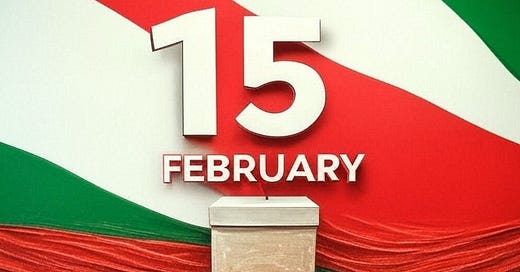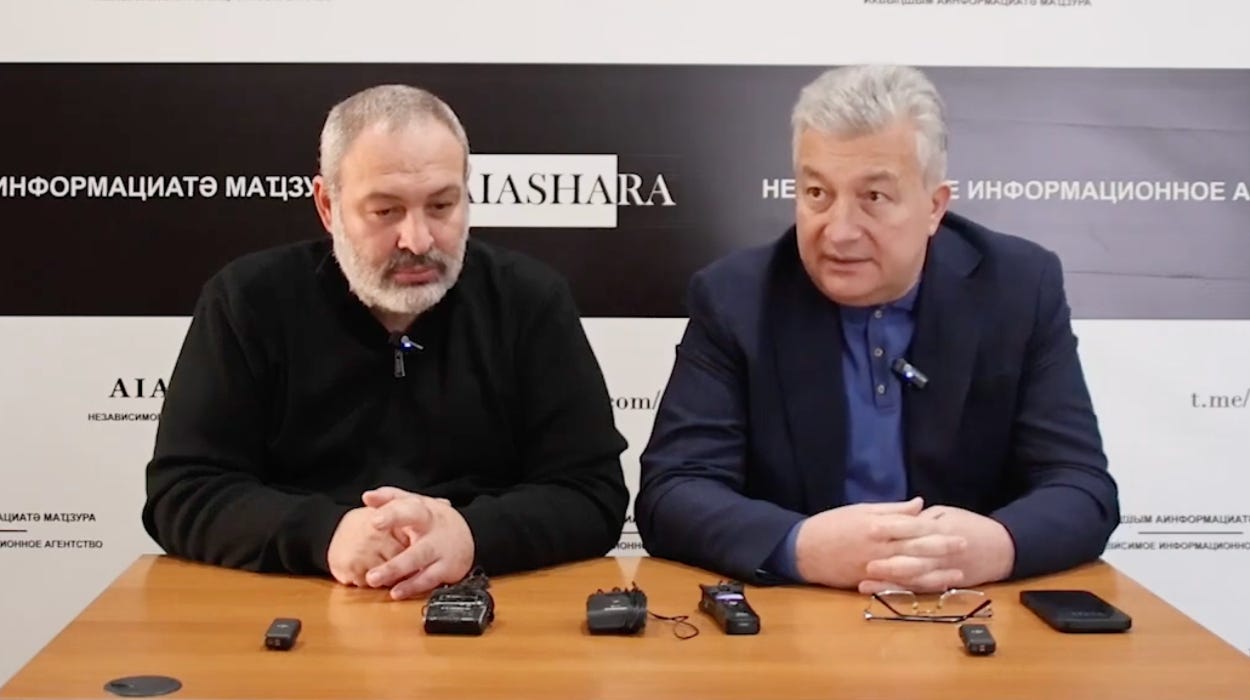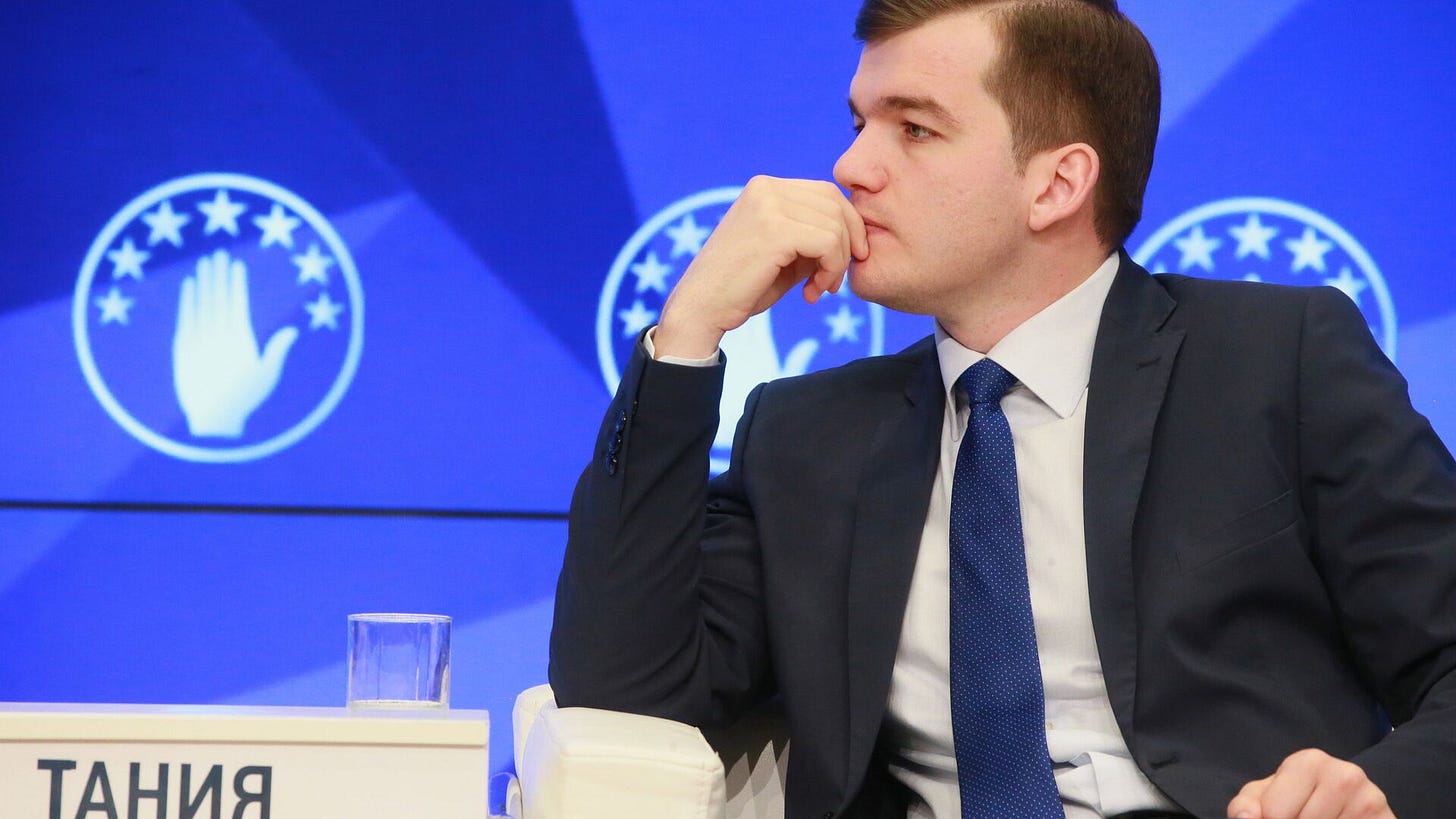The past week was a very busy one for Abkhazia. As the 15 February elections approach, a campaign of disinformation and manipulation against the opposition, particularly Adgur Ardzinba, continues to dominate the agenda. The pro-government team —backed by former President Aslan Bzhania— led by presidential candidate Badra Gunba, is pushing a disinformation and Black PR campaign at full speed, with support from certain Russian media outlets.
Meanwhile, political parties and civil society organisations have voiced strong opposition to these tactics, condemning efforts to sway public opinion through misinformation and intimidation. With tensions rising and external pressures mounting, the road to election day is shaping up to be anything but smooth.
Abkhazian political parties and public organisations have issued a joint statement condemning alleged disinformation and electoral manipulation. Signed by nine political and civic groups, it accuses certain actors of distorting facts, misleading the public, and reviving “anti-people” governance while demanding accountability from figures linked to Aslan Bzhania’s administration. The statement questions past political decisions, calls for public explanations from presidential candidate Badra Gunba, and urges legal action over alleged political violence. It concludes with a call for unity, urging citizens to stay calm, resist provocations, and reject manipulative tactics.
+ Electoral Manipulations and the Armenian Community in Abkhazia, by Diana Kerselyan
+ Who is Behind the Advertising Strategy of Badra Gunba’s Campaign?
+ Abkhaz Elections Under Russian Pressure, by Izida Chania
+ Ardzinba Campaign Denounces Disinformation Amidst Electoral Tensions
The Aamta Expert Fund condemned rising anti-Abkhaz narratives in Russian and some Abkhaz media, as well as anonymous Telegram channels. It dismissed claims of anti-Russian sentiment in Abkhazia as baseless and criticised the revocation of Russian citizenship from respected Abkhaz figures, calling it unjust and counterproductive.
Two prominent opposition figures, Leuan Mikaa and Kan Kvarchia, have alleged that their Russian citizenship has been revoked without official notification, describing the move as politically motivated and tied to former President Aslan Bzhania. Speaking at a press conference in Sukhum, the pair voiced concerns about the broader implications for Abkhaz politics and the suppression of dissent.
“It seems that being a patriot, loving your people, and defending their interests is now interpreted as a threat to Russia’s national security. I deeply regret that some officials in Russia view it this way.”
— Kan Kvarchia
+ Is Defending Abkhazia’s Interests a Threat to Russia’s Security?
Adgur Ardzinba expressed concern over reports that two prominent opposition figures, Leuan Mikaa and Kan Kvarchia, have been stripped of their Russian citizenship, calling the situation deeply troubling.
“Unfortunately, we learn about these cases from anonymous Telegram channels, which only adds to the confusion. These individuals are war veterans, and one is even a Hero of Abkhazia. Without people like them, Abkhazia’s history could have been very different,” Ardzinba stated. He emphasised the Abkhaz people’s deep appreciation for Russia’s support and called for careful consideration of all aspects of the situation to preserve unity and stability in Abkhazia.
In this piece, renowned Russian political scientist and international affairs expert Sergey Markedonov critically examines how Russian commentators misrepresent events in Abkhazia, often reinforcing misleading narratives that undermine Russian-Abkhazian relations.
At a campaign event for Adgur Ardzinba in Pitsunda, a man named Mikhail Belov attempted to stage a provocation. He later claimed that Badra Gunba’s team had offered him 100,000 rubles (approx. $1,000) to incite conflict and discredit Ardzinba’s supporters. As Belov is Russian, the alleged plan was to accuse Ardzinba’s team of attacking a Russian citizen, reinforcing anti-Abkhaz rhetoric ahead of a high-profile visit from Moscow. He admitted accepting the offer due to the money and revealed the details in a video statement.
The Acting President of Abkhazia, Valery Bganba, has written an open letter to Vladimir Putin, expressing concern over the political discourse in some Russian media. He criticised baseless claims that certain forces in Abkhazia are trying to undermine relations with Russia. Bganba warned that portraying candidates as either “pro-Russian” or “anti-Russian” distorts public perception and could damage Abkhaz-Russian ties.
Three days after the letter, on 31 January, First Deputy Chief of Staff of the Russian Presidential Administration Sergey Kiriyenko visited Abkhazia.
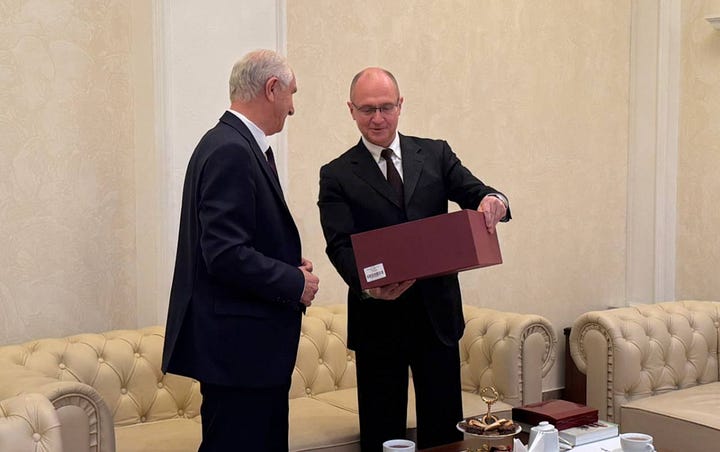
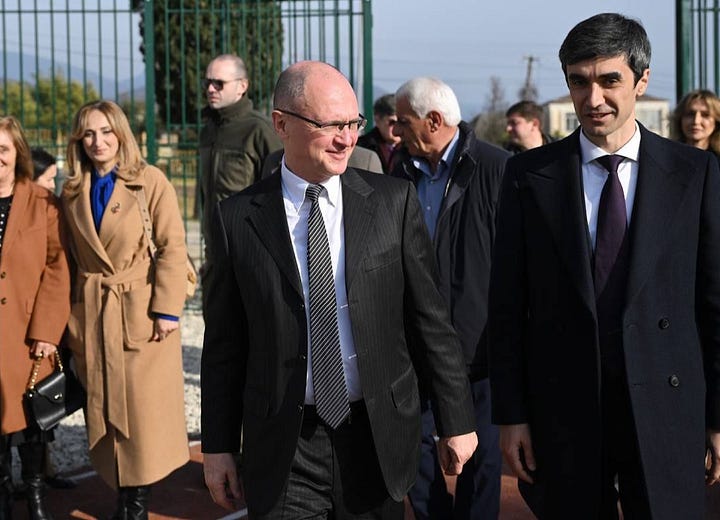
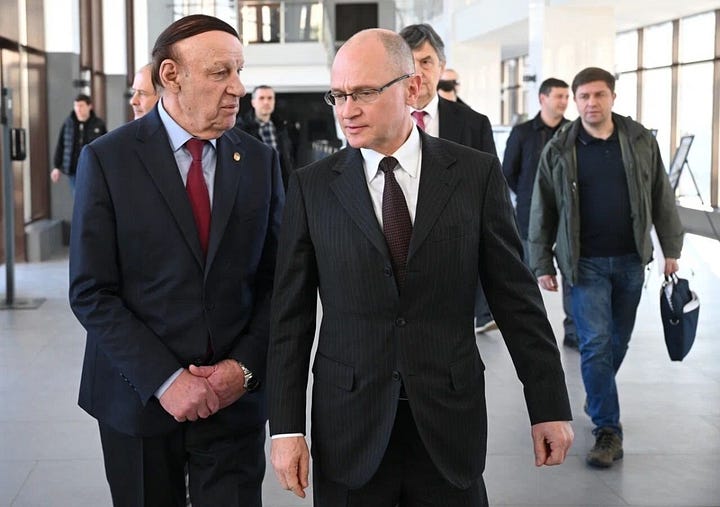
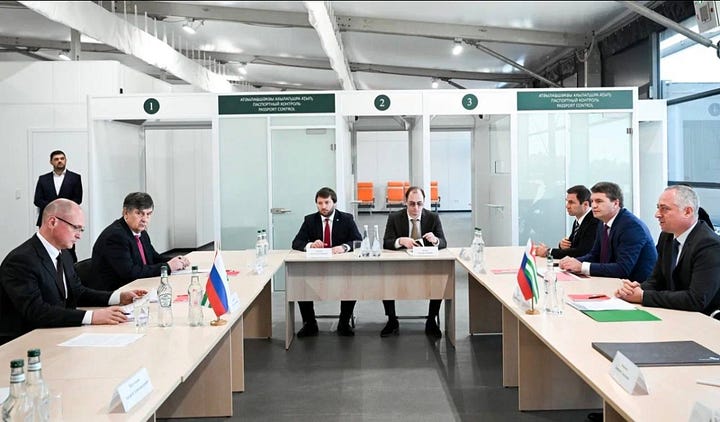
During his two-day visit, Kiriyenko toured Abkhaz State University, several schools and hospitals, State Drama Theatre, and the soon-to-be-opened Sukhum Airport. He also held meetings with Acting President Valery Bganba, presidential candidate Badra Gunba and his team, and Speaker of Parliament Lasha Ashuba.
Meanwhile, the Abkhaz Presidential Press Service has issued a statement regarding presidential candidate Badra Gunba’s participation in a meeting with Russian official Sergey Kiriyenko on the reconstruction of Sukhum Airport.
The statement clarified that Gunba resigned from his duties and took leave upon registering as a candidate. Under Abkhazian law, he cannot perform vice-presidential functions during the campaign, including overseeing airport reconstruction efforts. His participation in the meeting was deemed a direct violation of electoral regulations.
Sergey Kiriyenko stressed the importance of opening Sukhum Airport by 1 May, with a test flight planned for February to launch regular routes from Russia before the tourist season. He noted the airport’s potential for expansion and highlighted the need to focus on economic development beyond the elections, particularly in tourism and infrastructure. Kiriyenko also emphasised that while Russia respects Abkhazia’s electoral process, the real focus should be on economic development.
“Russia will respect any choice made by the Abkhaz people, but the elections will pass quickly, and the focus must shift to a serious development programme. The potential for economic cooperation between Russia and Abkhazia remains largely untapped—this is quite obvious.”
— Sergey Kiriyenko.
On the evening of 31 January, four of the five presidential candidates—Badra Gunba, Adgur Ardzinba, Oleg Bartsits, and Robert Arshba—answered questions from Russian and Abkhaz journalists in a live broadcast on Abkhaz State Television (AGTRK). The fifth candidate, Adgur Khurkhumal, did not attend and gave no explanation for his absence.
The three-hour programme, which drew significant public interest, is available on the Apsua TV YouTube channel.
The OKNO Telegram channel criticised the 31 January presidential program on AGTRK, accusing the state broadcaster of bias and selective questioning.
OKNO noted that journalists avoided pressing issues such as the energy crisis, upcoming blackouts, VAT, crypto mining, and foreign property sales. Instead, the main opposition candidate faced personal and leading questions, raising concerns about journalistic integrity.
The channel also condemned the participation of Russian journalist Konstantin Pridybaylo (RT), who insulted Abkhaz journalist Izida Chania on air. According to OKNO, moderators Anna Gunia and Robert Dzhopua failed to intervene, reinforcing accusations of AGTRK’s lack of neutrality.
OKNO urged the CEC to address the evident bias and take action regarding the conduct of AGTRK moderators and the involvement of a foreign journalist in the program.
Russia’s Central Election Commission head, Ella Pamfilova, called Abkhazia’s CEC chairman Dmitry Marshan, offering organisational and technical support to open additional polling stations in Russia.
Marshan thanked her but noted that, under Abkhaz law, polling stations outside Abkhazia must be finalised at least 30 days before the election, making further changes impossible.
“Since Russia’s recognition of Abkhazia’s independence and sovereignty, presidential elections in Abkhazia have traditionally been held in Russia since 2009, with polling stations in two cities: the capital, Moscow, and Cherkessk in the North Caucasus, where a significant number of Abkhaz-Abazin citizens of Abkhazia reside.”
Chairman of the Parliamentary Committee on State-Legal Policy, Daut Khutaba, addressed this issue in a briefing, commenting on citizens' requests to open additional polling stations in Russia for the Abkhaz presidential elections.
"I understand those in Russia who want to vote, but the law cannot be changed during the election process. The rules are not changed in the middle of the game," Khutaba stated.
The Abkhazian Foreign Ministry condemned the Into the Open Music Festival in Berlin for featuring the so-called “State Drama Theatre of Sukhumi,” stating it has no connection to Abkhazia. It accused Georgia of using culture to spread false narratives about Abkhazia and highlighted the systematic isolation of Abkhaz artists from international events.
Four Georgian opposition parties have appealed to Ahmed al-Sharaa, the newly declared leader of the Syrian opposition, requesting that he withdraw Syria’s recognition of Abkhazia and South Ossetia. They also congratulated the Syrian people, stating that under al-Sharaa’s leadership, they had overthrown Bashar al-Assad’s “brutal dictatorship.”
Abkhaz diplomat Kan Taniya dismissed the Georgian opposition’s appeal to Syria to revoke its recognition of Abkhazia, calling it legally meaningless and politically motivated. He stressed that “revoking recognition” is not a concept in international law—a country may cut diplomatic ties but cannot legally annul recognition. He also highlighted the long-term partnership between Abkhazia and Syria, based on mutual respect and historical ties, noting that severing relations would bring Syria no benefits.
Taniya attributed the Georgian opposition’s move to domestic political struggles, arguing that it was a populist tactic to regain public support rather than a viable diplomatic effort. He also underscored the deep historical connections between Abkhazia and Syria, home to a significant Abkhaz diaspora, which will continue to strengthen regardless of external pressure.
Acting President Valery Bganba chaired a meeting on Abkhazia’s energy situation, focusing on electricity purchases from Inter RAO and efforts to combat crypto mining. With the social electricity supply ending in early February, Abkhazia will need to buy power until the Jvari Reservoir refills in March. Energy Minister Jansukh Nanba announced a draft law to allow the destruction of seized crypto mining equipment, while Bganba revealed that documents confirm the “Kavkasioni” high-voltage transit line is registered under Chernomorenergo, Abkhazia’s state energy company.
Leuan Lagulaa, editor-in-chief of Apsny Khabar, has written about the growing debate over the “Against All” option in presidential elections, stressing its legal and political significance.
He argues that in Abkhazia’s highly centralised presidential system, where the winner gains full control over all branches of power, this option serves as a safeguard against the monopolisation of authority. Previously, a candidate could win with just 50% +1 vote and take absolute power, even if their first-round support was as low as 20–23%. Now, a candidate must outperform both their rivals and the "Against All" vote, ensuring broader legitimacy. Lagulaa describes the “Against All” vote as a tool for demanding change and preventing power from being concentrated in a single leader’s hands. "It is not just a protest—it is a call for a fair system," he concludes.
“Aslan Bzhania Will Be the First President to Go to Prison”
— Garri Kokaya
Former MP Garri Kokaya has stated that key figures behind the past five years of governance will face justice.
“I assure you, they will go to prison. For the first time in Abkhazia’s history, a former president must be held accountable, but first, we need to strip him of immunity. This requires the support of Parliament and society,” Kokaya declared.
He also noted that amid the current political turmoil, 60% of the presidential administration and cabinet members, along with most district heads, have gone on leave.
The Abkhaz diaspora in Turkey has issued a statement condemning efforts to divide Abkhazia’s people and spread false claims about the diaspora’s hostility toward other communities. They reaffirmed their commitment to Abkhazia’s multicultural harmony and independence.
The statement outlined key demands, including justice, economic reforms, quality education, and a strong fight against crime and drug abuse. It also called for closer ties with Russia and the North Caucasus, while urging Georgia to recognise Abkhazia’s sovereignty.
Expressing concern over the influence of certain Russian oligarchs in Abkhazia, the diaspora urged Moscow to prevent external interference. They voiced hope that the upcoming elections would mark a new beginning for the Abkhaz people.
Vianor Ashba, Hero of Abkhazia and chairman of the Aiaaira Veterans and Citizens’ Union, stressed that preserving the homeland remains the nation’s fundamental duty.
“We must follow the course set by Vladislav Ardzinba, whose legacy deserves respect and continuation,” Ashba stated. He expressed confidence that Adgur Ardzinba’s leadership would be a turning point for Abkhazia, bringing stability, prosperity, and the conditions needed for social and economic growth.
Make a donation today to support the work of AW and help us continue our projects.

